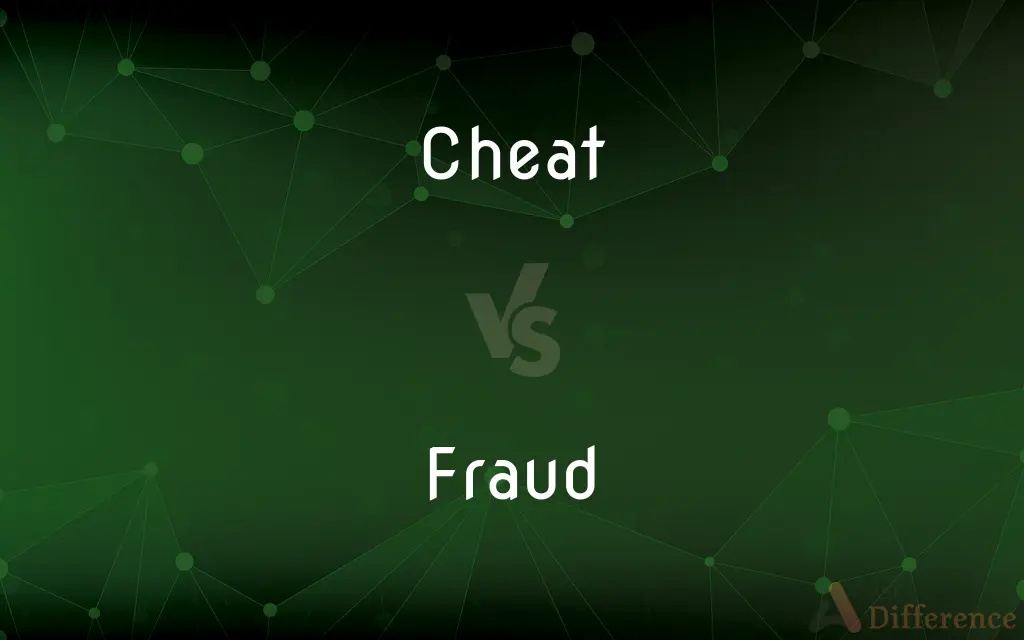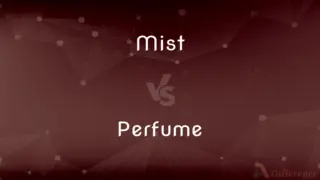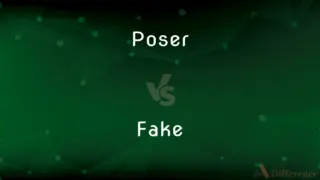Cheat vs. Fraud — What's the Difference?
By Maham Liaqat & Urooj Arif — Updated on March 11, 2024
Cheat involves deception for personal gain, while fraud is a legal term for deceit with financial or personal gain.

Difference Between Cheat and Fraud
Table of Contents
ADVERTISEMENT
Key Differences
Cheat typically refers to acts of dishonesty or deceit in informal or everyday contexts, such as in games or personal relationships. It involves breaking rules to gain an advantage, often without legal implications. On the other hand, fraud is a specific legal term that denotes a deliberate deception to secure unfair or unlawful gain, usually of a financial nature. Fraudulent activities can lead to legal penalties, including fines and imprisonment.
Cheating can occur in various settings, including academic, sports, and relationships, where individuals may seek to gain an advantage or benefit through dishonest means. This could involve copying someone's work, using prohibited materials, or being unfaithful in a relationship. Whereas, fraud is often associated with more formal contexts, such as finance, business, and legal matters, where the deception involves contracts, financial transactions, and identity theft.
The intent behind cheating and fraud is similar, as both involve deception for personal gain. However, the scope and consequences of fraud are generally more severe, given its legal implications and potential to cause significant financial loss and damage to victims. Cheating, while ethically wrong, may result in less severe consequences, such as loss of reputation, trust, or academic penalties.
Cheating is often seen as a breach of trust or ethical standards, leading to social disapproval or personal guilt. It reflects on an individual's character and moral judgment. In contrast, fraud not only has ethical and social ramifications but also legal ones. Victims of fraud have recourse through legal systems to seek compensation and justice, highlighting the broader societal impact of fraudulent activities.
While both cheating and fraud are deceptive acts with self-serving motives, their differentiation lies in the legal recognition and consequences of fraud. Cheating undermines personal and professional integrity, whereas fraud can lead to significant legal penalties and societal harm.
ADVERTISEMENT
Comparison Chart
Definition
Deception for personal advantage
Legal term for deceit for gain
Context
Everyday, informal settings
Formal, legal, financial contexts
Consequences
Social disapproval, personal guilt
Legal penalties, financial loss
Scope
Individual level, less severe
Wider societal impact, more severe
Legal Implications
Rarely involves legal consequences
Involves legal consequences
Compare with Definitions
Cheat
Being unfaithful in a relationship.
Cheating on a partner can destroy trust.
Fraud
Deception in financial transactions.
Committing fraud by using someone else's credit card.
Cheat
Breaking rules for personal gain.
Trying to cheat the system can lead to trouble.
Fraud
Misrepresenting information in business.
Falsifying financial records constitutes fraud.
Cheat
Act of dishonesty in a game.
He tried to cheat by moving the chess piece when I wasn't looking.
Fraud
Illegal act for personal or financial gain.
Identity theft is a common form of fraud.
Cheat
Gaining an unfair advantage in sports.
Athletes cheat by using performance-enhancing drugs.
Fraud
Scamming individuals online.
Online dating scams are a type of emotional fraud.
Cheat
Deceiving in academic work.
Using a hidden note during the test is a way to cheat.
Fraud
Legal charge for deceitful practices.
He was charged with fraud for selling fake insurance.
Cheat
To deceive by trickery; swindle
Cheated customers by overcharging them for purchases.
Fraud
In law, fraud is intentional deception to secure unfair or unlawful gain, or to deprive a victim of a legal right. Fraud can violate civil law (e.g., a fraud victim may sue the fraud perpetrator to avoid the fraud or recover monetary compensation) or criminal law (e.g., a fraud perpetrator may be prosecuted and imprisoned by governmental authorities), or it may cause no loss of money, property, or legal right but still be an element of another civil or criminal wrong.
Cheat
To deprive by trickery; defraud
Cheated them of their land.
Fraud
A deception practiced in order to induce another to give up possession of property or surrender a right.
Cheat
To mislead; fool
Illusions that cheat the eye.
Fraud
A piece of trickery; a trick.
Cheat
To act dishonestly; practice fraud.
Fraud
One that defrauds; a cheat.
Cheat
To violate rules deliberately, as in a game
Was accused of cheating at cards.
Fraud
One who assumes a false pose; an impostor.
Cheat
(Sports) To position oneself closer to a certain area than is normal or expected
The shortstop cheated toward second base.
Fraud
(law) The crime of stealing or otherwise illegally obtaining money by use of deception tactics.
Cheat
An act of cheating; a fraud or swindle.
Fraud
Any act of deception carried out for the purpose of unfair, undeserved and/or unlawful gain.
Cheat
One who cheats; a swindler.
Fraud
The assumption of a false identity to such deceptive end.
Cheat
A technique that exploits a flaw or hidden feature in a video game or computer program.
Fraud
A person who performs any such trick.
Cheat
(Law) Fraudulent acquisition of another's property.
Fraud
(obsolete) A trap or snare.
Cheat
(Botany) Any of several species of brome, especially Bromus secalinus, an annual European grass widespread as a weed.
Fraud
(obsolete) To defraud
Cheat
(intransitive) To violate rules in order to gain, or attempt to gain, advantage from a situation.
My brother flunked biology because he cheated on his mid-term.
Fraud
Deception deliberately practiced with a view to gaining an unlawful or unfair advantage; artifice by which the right or interest of another is injured; injurious stratagem; deceit; trick.
If success a lover's toil attends,Few ask, if fraud or force attained his ends.
Cheat
(transitive) To deceive; to fool; to trick.
My ex-wife cheated me out of $40,000.
He cheated his way into office.
Fraud
An intentional perversion of truth for the purpose of obtaining some valuable thing or promise from another.
Cheat
Someone who cheats.
Fraud
A trap or snare.
To draw the proud King Ahab into fraud.
Cheat
An act of deception or fraud; that which is the means of fraud or deception.
Fraud
Intentional deception resulting in injury to another person
Cheat
The weed cheatgrass.
Fraud
A person who makes deceitful pretenses
Cheat
(card games) A card game where the goal is to have no cards remaining in a hand, often by telling lies.
Fraud
Something intended to deceive; deliberate trickery intended to gain an advantage
Cheat
(video games) A hidden means of gaining an unfair advantage in a video game, often by entering a cheat code.
Cheat
(obsolete) A sort of low-quality bread.
Cheat
An act of deception or fraud; that which is the means of fraud or deception; a fraud; a trick; imposition; imposture.
When I consider life, 'tis all a cheat.
Cheat
One who cheats or deceives; an impostor; a deceiver; a cheater.
Airy wonders, which cheats interpret.
Cheat
A troublesome grass, growing as a weed in grain fields; - called also chess. See Chess.
Cheat
The obtaining of property from another by an intentional active distortion of the truth.
Cheat
Wheat, or bread made from wheat.
Their purest cheat,Thrice bolted, kneaded, and subdued in paste.
Cheat
To deceive and defraud; to impose upon; to trick; to swindle.
I am subject to a tyrant, a sorcerer, that by his cunning hath cheated me of this island.
Cheat
To beguile.
To cheat winter of its dreariness.
Cheat
To practice fraud or trickery; as, to cheat at cards.
Cheat
Weedy annual grass often occurs in grainfields and other cultivated land; seeds sometimes considered poisonous
Cheat
Weedy annual native to Europe but widely distributed as a weed especially in wheat
Cheat
Someone who leads you to believe something that is not true
Cheat
The act of swindling by some fraudulent scheme;
That book is a fraud
Cheat
A deception for profit to yourself
Cheat
Deprive somebody of something by deceit;
The con-man beat me out of $50
This salesman ripped us off!
We were cheated by their clever-sounding scheme
They chiseled me out of my money
Cheat
Defeat someone in an expectation through trickery or deceit
Cheat
Engage in deceitful behavior; practice trickery or fraud;
Who's chiseling on the side?
Common Curiosities
How do victims of fraud seek justice?
Victims can pursue legal action to seek compensation and hold the perpetrators accountable.
What is cheating?
Cheating involves dishonest actions to gain an unfair advantage in various contexts.
Why is fraud considered more serious than cheating?
Fraud involves legal violations that can lead to significant financial loss and damage to victims, warranting legal penalties.
How can organizations prevent fraud?
By implementing strict ethical guidelines, conducting regular audits, and ensuring transparency.
How does society view cheating and fraud?
Both are viewed negatively, but fraud is taken more seriously due to its legal implications.
What defines fraud?
Fraud is a deliberate deception for financial or personal gain, recognized as a crime.
Is all cheating considered fraud?
Not all cheating falls under the legal definition of fraud, as it often occurs in non-financial contexts.
What impact does cheating have on relationships?
It can lead to a loss of trust, emotional distress, and potentially the end of the relationship.
Can cheating lead to legal consequences?
While less common, certain forms of cheating, especially in professional or financial contexts, can have legal implications.
What can be done to reduce cheating in academic settings?
Implementing strict academic integrity policies and educating students on ethics.
Why do people commit fraud?
For personal or financial gain, often driven by greed or financial pressure.
Can a person be guilty of both cheating and fraud?
Yes, if their actions involve dishonesty in personal contexts and meet the legal criteria for fraud.
Are there different types of fraud?
Yes, including but not limited to financial fraud, identity theft, and insurance fraud.
What is the difference between cheating and lying?
Cheating involves actions to gain an unfair advantage, while lying is the act of making a false statement.
Can technology help in detecting fraud?
Yes, through the use of sophisticated algorithms and monitoring systems to detect unusual patterns.
Share Your Discovery

Previous Comparison
Mist vs. Perfume
Next Comparison
Poser vs. FakeAuthor Spotlight
Written by
Maham LiaqatCo-written by
Urooj ArifUrooj is a skilled content writer at Ask Difference, known for her exceptional ability to simplify complex topics into engaging and informative content. With a passion for research and a flair for clear, concise writing, she consistently delivers articles that resonate with our diverse audience.















































